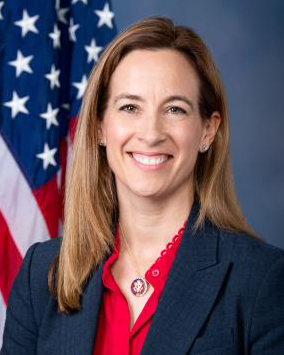
‘I think there was just a broad rethinking of how U.S. businesses need to compete and what they need to do to compete.’
U.S. Rep. Mikie Sherrill, D-11th District, took part in a hearing last week as part of her work on a special House Select Committee on Strategic Competition Between the United States and the Chinese Communist Party (CCP).
The bipartisan committee, supported by leadership of both parties, was created to address the multiple threats posed by the CCP.
“The CCP is a threat to our democracy and our way of life. They are currently reshaping the international order through economic, diplomatic, military, and cyber tactics, and we must respond with smart, thoughtful policies,” the congresswoman said when she was appointed to the group in February. “To tackle these challenges, America will need to modernize our military to strengthen our national supply chains, advocate for human rights across the globe, and support sovereign democracies.”
Sherrill noted that in a divided Congress, the committee was likely the best opportunity to respond to China’s aggression and accomplish real results.
That May 17 hearing – titled “Leveling the Playing Field: How to Counter the CCP’s Economic Aggression” – came against the backdrop of increasingly fraught relations between the United States and China and during Asian American and Pacific Islander (AAPI) Heritage Month. During its proceedings, Sherrill brought the concerns of New Jersey businesses while focusing on how the United States can leverage its economic might and partner with allies to deter rampant illegal dumping and intellectual property theft by the CCP, win the competition for advanced AI technology, and combat the CCP’s “Made in China 2025” industrial policy aimed at dominating tomorrow’s advanced sectors.

“The long-term anti-competitive actions of China, including forced IP transfers, dumping, illegal subsidies, corporate espionage, and currency manipulation, has made the work of this committee to ensure American economic competitiveness incredibly timely,” said Sherrill. “This hearing made clear why we need an overarching economic strategy to counter the CCP by raising the level of official U.S. Commerce Department engagements abroad in order to support business and industry here at home.”
Ahead of that meeting, Sherrill caught up with NJBIZ to discuss the committee’s work as well as some broader economic issues, both here in the Garden State and nationally.
A broad rethinking
Sherrill explained that there has been concern for quite a while about the tactics employed by the CCP in different business sectors, and the need to combat them.
“It’s just so incredibly frustrating because have the most innovative workers in the world. We have the best educated workers in the world. We have access to the most high-end technology, not just in the United States, but with our global allies,” she told NJBIZ. “So, we can compete anywhere and everywhere if it’s a level playing field. But with China, it is never a level playing field. They are always undermining the global rules-based order. It’s an impediment to our national security. It’s harmed our businesses here at home and undermines our innovation as they continue to steal technology and utilize it in ways that our contrary to our values.”
So, the representative said, with all of that in mind, she felt that we have not been competing as robustly as we should have been.
She feels like the Russian invasion of Ukraine opened many eyes to the dangers of depending on an autocrat as well as China’s repressive, zero-COVID policy, and the supply chain issues that emerged from the pandemic.
‘We want serious lawmakers’
Speaker of the U.S. House of Representatives Kevin McCarthy and Minority Leader Hakeem Jeffries have worked to ensure that the Select Committee on Strategic Competition Between the United States and the Chinese Communist Party (CCP) is dedicated solely to addressing multiple threats posed by China.
“We want serious lawmakers. This isn’t for somebody to go in and be viral to make some point,” said McCarthy. “This is to work together as one Congress, on one of our greatest challenges for the future. I want this committee to last beyond who’s in the majority, and never, ever be a partisan committee.”
Sherrill echoed that sentiment.
“I am confident that this committee will work on a bipartisan basis to enact substantive, policy-based policies that differentiate between the Chinese people and the regime that is oppressing them,” she said.
“I think there was just a broad rethinking of how U.S. businesses need to compete and what they need to do to compete,” Sherrill explained. “So, I think the committee is incredibly timely. The only reason I agreed to participate in it because I was assured by Chairman Gallagher and received assurances from the speaker and the leader that this would be a serious, bipartisan committee. And the work of this committee was actually to get results and support our country, and not simply as some sort of campaign attack or who’s tougher on China.
“I wanted to make sure it was truly a committee where we were coming together to solve these problems in a real way,” she continued. “And that is what I’ve found it to be.”
Sherrill said that while the country is facing one of its most partisan moments in memory, she has found the committee refreshing because of its bipartisan members, who are simply serving their constituents and supporting the nation.
“We don’t always agree on everything on the committee. And sometimes that breaks down on party lines. Sometimes it doesn’t,” said Sherrill. “But there is an understanding that we are working very hard. Even if we have disagreements, it’s not because we are looking to get into some manufactured, partisan fight. We’re actually just trying to come to the best solutions for the problems our nation is facing with respect to competing economically across the world.”
Making investments
The conversation shifted to manufacturing and supply chains, issues that Sherrill regularly speaks about, including at the recent State-of-the-State Manufacturing Summit in Trenton, and especially amid New Jersey’s post-pandemic manufacturing momentum.

She touted the work done in the last Congress, pointing to investments in research and development (R&D) through legislation such as the Chips Act.
“Some of the things that we were able to accomplish in the last Congress have set the path for the future of our economy,” said Sherrill. “And I’m particularly thinking about the competition that we’ve engaged in and looking at some of our true national security initiatives and how we are going to fence off some of those areas so that we can remain competitive; reshore American manufacturing; invest in our innovation.”
Adding those investments and that push to New Jersey’s already-established advantages – its location, education, talent and innovation/manufacturing pedigree – will help fuel the Garden State’s economy, Sherrill believes.
“This is all so critically important for our economy,” she explained. “And I think starting that now and with the understanding – as I talked about with the Russian invasion of Ukraine and Zero-COVID policy and COVID itself and the supply chains – I just think we were at a moment and what was amazing was that we were able to seize that moment and really put in place some economic tools that I think are going to be very good for the United States economy.”
This is all so critically important for our economy.
— U.S. Rep. Mikie Sherrill
The conversation closed with a topic that remains pressing and unsettled, now nearly a week closer to a catastrophic deadline for the nation’s economy: The debt ceiling.
“I just cannot in any way, shape, or form conceive of us as members of the U.S. government not lifting the debt ceiling,” said Sherrill. “It’s just such self-harm that I’m almost banking on us lifting it because there’s just no alternative. I don’t think people understand the economic catastrophe that we would be facing. And I think people have heard so many exaggerations of crises that they’ve almost turned off listening to government. And, hopefully, they’ll be able to turn this off because I think, and I pray that we will be lifting this and we will be continuing our work here.”
After ticking off a number of potential ramifications of a default, Sherrill said simply that the debt ceiling must be lifted.
“I know there’s intense negotiations going on. I’m constantly engaged with my leadership on what this has to look like and how it important it is, and what those areas are that we have to make sure that we’re supporting for the future of our economy,” said Sherrill. “So, its certainly something that I’m very concerned about.”
e






